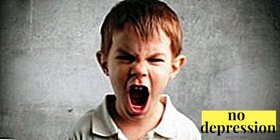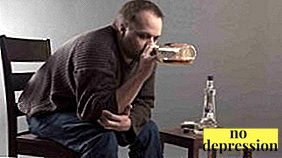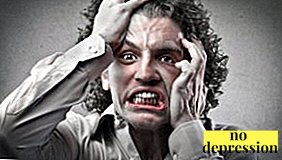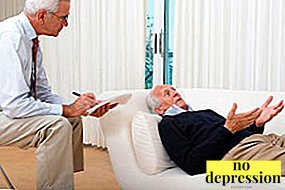People diagnosed with schizophrenia quite difficult to live a normal life. Their minds are clouded, they cannot distinguish between what is reality and what is fiction.
This disease does not spare anyone. What to do if schizophrenia is seen? What are the symptoms and signs of this disease in men?
What is this disease?

Schizophrenia is mental illnesswhich bends the thinking of a person, confuses his thoughts.
It is a chronic disorder and the most serious among all mental ills.
Often schizophrenics confuse reality with fiction, they have delusional and obsessive thoughts, it becomes confused, it seems that someone is following them, weaving a plot against them, trying to kidnap them.
Schizophrenia is often confused with a split personality, many believe that it is one and the same disease, but it is not. Schizophrenic it's quite difficult to live in a society he has some problems in dealing with people, in relationships.
Exists two disease cycles: remission and relapse. During remission, a person can lead a completely normal life, and during relapse the symptoms become obvious and noticeable to other people.
The state of relapse is also called an episode. In some patients, only a few episodes can happen in their entire life, while others suffer from them quite often.
Both men and women suffer from schizophrenia. It is impossible to determine who is more exposed. Male more pronounced symptoms diseases and can occur at an early age, which is not typical for the female sex.
Causes and risk group
 Heredity: one of the main causes of the disorder. Parents may not be sick and even among their close relatives there may not be someone who would suffer from schizophrenia. But in the family will definitely be those who suffered from this mental disorder.
Heredity: one of the main causes of the disorder. Parents may not be sick and even among their close relatives there may not be someone who would suffer from schizophrenia. But in the family will definitely be those who suffered from this mental disorder.- The brain: changes in the structure of this organ can be a causal development of schizophrenia. Also head injuries, swelling, intoxication.
- Severe illnesses.
- Stress: stressful situations have never been helpful to anyone.
Permanent staying under stress, or one episode that strongly shook the human body, can “activate” the disorder.
- The use of psychotropic substances or alcohol: it could be both once and systematically.
- Strong mental load.
- Unfavorable situation in the family: constant shouts, scandals, fights can lead to the emergence of schizophrenia.
At risk are:
 genetically predisposed people;
genetically predisposed people;- emotionally unstable;
- addicted people;
- survivors of serious illness;
- injured head;
- those who are constantly in a hostile environment.
Stages
Experts identify three stages of schizophrenia: mastering, adaptation and degradation. Mastery (at this stage the patient experiences anxiety and fear).
The familiar world no longer seems the way it was before. A person experiences a kind of insight: he feels himself either omnipotent, or feels that someone is plotting against him.
On initial stage it is impossible to be calm, the patient is always in fear, he suspects everyone, is constantly worried. The patient sees what he previously did not seem to see. The world around becomes bright.
It is believed that having survived this stage, the patient can return to the usual life, or he is immersed in a long stage of adaptation.
Adaptation (at this stage, the changes no longer seem so bright and exciting). The patient gradually gets used to his new world. He is no longer surprised by hallucinations and other symptoms of the disease.
During this period, two worlds, as it were, unite and both live in the consciousness of man. Also characterized by such signs: the repetition of the same gestures, strange facial expressions, walking in circles and much more.

Degradation (at this stage there is an emotional burnout). The man no longer seems like he was before. In his eyes there is no desire to live and interest.
His intellectual abilities are also dulled. In this phase, the patient is not interested in anything, his hallucinations become dull, he becomes obsessed, all the time he says something incoherent under his breath.
How to recognize the first signs?
It is worth paying attention to the behavior of a man: the first sign is uncharacteristic coldness and dislike for loving people.
A man becomes irritable, meaner, can be rude for no reason, try to hurt the one he loves most. It borders many feelings simultaneously: love and hate, hostility and interest.
The second sign may be that yesterday the man was full of strength, ambitious and active, and today he is experiencing apathy, becomes absolutely inactive.
Many blame it on the usual laziness. It is worth sounding the alarm if at some point a man quit his favorite job, abandoned his hobby, lost interest in all his business, always wants to do something, but cannot.
Another sign is that the man does not take care of himself, ignores personal hygiene, becomes untidy and untidy.

Especially if such behavior is usually unacceptable for him.
One of the most important signs is that a man becomes closed in itself.
He can break all his connections and immerse himself in his inner world.
What are the symptoms?
There are two types of symptoms: positive (visible to all others, not only to specialists) and negative (loss of vital interests, difficult to recognize).
Positive:
- hallucinations (auditory, visual, tactile, olfactory) - auditory hallucinations are more common for schizophrenic patients, they hear voices that make them do something, condemn, inspire, call for action;
- rave (crazy ideas, persecution, conspiracy theories) - all this and much more is experiencing a patient, he can magnify himself as some famous person and be absolutely sure that he is;
- thinking disorder - it becomes difficult for the patient to systematize his thoughts and actions, often their speech seems illogical and incoherent;
- movement disturbance - schizophrenic sufferers may involuntarily move, make strange grimaces, they repeat their movements over and over, or fall into an immobilized state.
Negative:
 lack of emotions ("stone" facial expression, does not respond to external stimuli, monotonous, calm voice);
lack of emotions ("stone" facial expression, does not respond to external stimuli, monotonous, calm voice);- the absence of the former thirst for life (the interest and interest is lost, there is no former enthusiasm);
- inability to do the old things;
- inability to make plans;
- apathy and lethargy;
- self-isolation;
- speech disorder (it becomes difficult for a person to choose the right words, sometimes he says something that does not concern the topic of conversation).
About the symptoms of schizophrenia in men in this video:
Features of manifestation at different ages
- U guys: the most severe is schizophrenia, which manifests itself at a young age (up to 25 years). It is characterized by a change in social circle, problems with sleep, severe irritability, and the patient’s behavior may be similar to a child, sometimes an irresistible craving for drugs or alcohol appears.
At this age, men usually suffer from a catatonic form of the disorder - consciousness remains, but motor disturbances are observed.
- In middle-aged men (after 30 years) most often there is a paranoid form of schizophrenia. Characterized by delusional and obsessive ideas, paranoia. If a man was dependent on something before the manifestation of the disease, then the dependence can be significantly aggravated. Obsessive thoughts can grow into the fact that, for example, a man unfoundedly begins to be jealous and shows his jealousy in a very aggressive way.
 Older people schizophrenia does not occur. All men who survived to old age were diagnosed with the disorder much earlier. Experts say that after 50 schizophrenia can not develop. Often, under the symptoms similar to schizophrenia, another disease is hidden. But there are several cases when, after 60 years, they diagnosed "schizophrenia." At this age, the paranoid form prevails, visual hallucinations, loneliness, lack of desire to do anything.
Older people schizophrenia does not occur. All men who survived to old age were diagnosed with the disorder much earlier. Experts say that after 50 schizophrenia can not develop. Often, under the symptoms similar to schizophrenia, another disease is hidden. But there are several cases when, after 60 years, they diagnosed "schizophrenia." At this age, the paranoid form prevails, visual hallucinations, loneliness, lack of desire to do anything.
Treatment
- Hospital treatment: Particularly severe patients are admitted to hospital and given the necessary treatment (see photo below).
- Acceptance of antipsychotic drugs: He will not get rid of schizophrenia, but will help to stop the symptoms of the disease. If depression is also added to schizophrenia, they can prescribe antidepressants.
- Consultation psychotherapist: he will help the patient understand what is happening to him, explain why he needs to be treated, answer all questions and simply support him.
- Family: another important factor. The family of the patient should help and support the patient so that he feels the love and protection of loved ones. They must control his behavior, make sure that he follows the treatment clearly and teach self-care about himself.
Such patients need constant monitoring, they can be dangerous for themselves or others.
Also banal proper nutrition and try to lead a correct lifestyle, play sports, walk more in the fresh air.
Forecast

Schizophrenia is an incurable disease. But this no sentence.
Through the efforts of the patient and with the help of his loved ones, it is possible to achieve that a person will live a normal life: go to work, build relationships, start a family.
For this you need take control of your diseaseBe able to prevent symptoms before they appear. The patient necessarily needs professional help from a doctor: he will tell you what to do and how to act, what drugs to take.
To the patient need rehabilitation, support groups, in which people gather with the same problem, family assistance. A person will have to take the necessary medicines throughout his life and courageously fight the disease.
Schizophrenia is a serious and terrible mental illness. But do not take the diagnosis as a sentence. Although schizophrenia is an incurable disease, you can live with it.
The main thing, consult a specialist. In no case can not self-medicate, especially taking pills without prescribing a doctor. This can aggravate the course of the disease.
Schizophrenia with a low degree of progression in a man:

 Heredity: one of the main causes of the disorder. Parents may not be sick and even among their close relatives there may not be someone who would suffer from schizophrenia. But in the family will definitely be those who suffered from this mental disorder.
Heredity: one of the main causes of the disorder. Parents may not be sick and even among their close relatives there may not be someone who would suffer from schizophrenia. But in the family will definitely be those who suffered from this mental disorder. genetically predisposed people;
genetically predisposed people; lack of emotions ("stone" facial expression, does not respond to external stimuli, monotonous, calm voice);
lack of emotions ("stone" facial expression, does not respond to external stimuli, monotonous, calm voice); Older people schizophrenia does not occur. All men who survived to old age were diagnosed with the disorder much earlier. Experts say that after 50 schizophrenia can not develop. Often, under the symptoms similar to schizophrenia, another disease is hidden. But there are several cases when, after 60 years, they diagnosed "schizophrenia." At this age, the paranoid form prevails, visual hallucinations, loneliness, lack of desire to do anything.
Older people schizophrenia does not occur. All men who survived to old age were diagnosed with the disorder much earlier. Experts say that after 50 schizophrenia can not develop. Often, under the symptoms similar to schizophrenia, another disease is hidden. But there are several cases when, after 60 years, they diagnosed "schizophrenia." At this age, the paranoid form prevails, visual hallucinations, loneliness, lack of desire to do anything.

